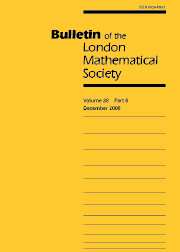Article contents
ON ARTIN'S CONJECTURE, I: SYSTEMS OF DIAGONAL FORMS
Published online by Cambridge University Press: 01 May 1999
Abstract
As a special case of a well-known conjecture of Artin, it is expected that a system of R additive forms of degree k, say
formula here
with integer coefficients aij, has a non-trivial solution in ℚp for all primes p whenever
formula here
Here we adopt the convention that a solution of (1) is non-trivial if not all the xi are 0. To date, this has been verified only when R=1, by Davenport and Lewis [4], and for odd k when R=2, by Davenport and Lewis [7]. For larger values of R, and in particular when k is even, more severe conditions on N are required to assure the existence of p-adic solutions of (1) for all primes p. In another important contribution, Davenport and Lewis [6] showed that the conditions
formula here
are sufficient. There have been a number of refinements of these results. Schmidt [13] obtained N[Gt ]R2k3 log k, and Low, Pitman and Wolff [10] improved the work of Davenport and Lewis by showing the weaker constraints
formula here
to be sufficient for p-adic solubility of (1).
A noticeable feature of these results is that for even k, one always encounters a factor k3 log k, in spite of the expected k2 in (2). In this paper we show that one can reach the expected order of magnitude k2.
- Type
- NOTES AND PAPERS
- Information
- Copyright
- © The London Mathematical Society 1999
- 5
- Cited by




